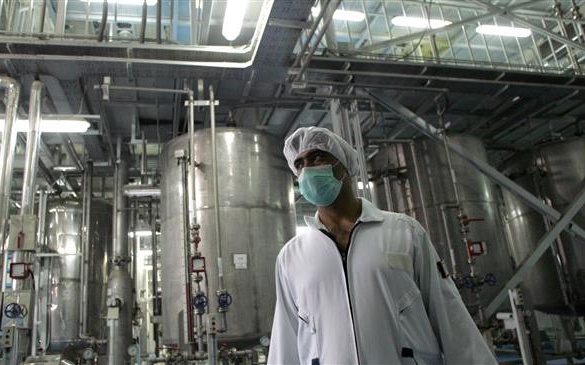UPDATE, 1315 GMT:
Russian Foreign Minister Sergey Lavrov has asked Iran to honor its commitments under the 2015 nuclear deal:
We are calling on our Iranian colleagues to show restraint and in no way to be subjected to emotions, and observe key provisions of the deal on guarantees with the IAEA [International Atomic Energy Agency] and provisions of a supplementary protocol for this agreement.
At the same time, Lavrov called on European countries to make the Special Purpose Vehicle, for non-dollar trade in Iranian oil and other commodities and goods, “truly effective”: “Without this it will be very difficult to hold a reasonable and fruitful dialogue on preserving the Joint Comprehensive Plan of Action.”
UPDATE, 1400 GMT:
France has urged Iran to reverse its breaking of the limits on uranium enrichment under the 2015 nuclear deal; however, the European members of the 5+1 Powers — France, the UK, and Germany — will not trigger a dispute mechanism that could lead to the reimposition of UN sanctions.
Two European diplomats disclosed the position. One said of the triggering of the dispute mechanism, “Not for now. We want to defuse the crisis
China, another 5+1 member, said it regretted Iran’s move but urged all parties to exercise restraint. It added that the Trump Administration’s policy of maximum pressure on Iran was the “root cause of the current tensions”.
UPDATE, 1310 GMT:
In an unusual assertion, the White House accused Iran of violating the nuclear deal “even before its existence”.
Officials did not explain how Tehran could break the terms of an agreement when it did not exist. Instead, the statement reiterated:
The United States and its allies will never allow Iran to develop nuclear weapons.
Maximum pressure on the Iranian regime will continue until its leaders alter their course of action.
Iranian Foreign Minister Mohammad Javad Zarif responded:
Seriously? pic.twitter.com/oZApumVt2T
— Javad Zarif (@JZarif) July 2, 2019
At a bill signing in the White House, Donald Trump said, “They know what they’re doing. They know what they’re playing with, and they’re playing with fire. So no message to Iran whatsoever.”
Iran has suspended part of its commitment under the 2015 nuclear deal, breaking the limit on low-grade enriched uranium.
Foreign Minister Mohammad Javad Zarif announced on Monday, in a ceremony near the Natanz enrichment plant in central Iran, that Tehran has exceeded the 300 kg (660 pounds) of 3.67% uranium allowed under the Joint Comprehensive Plan of Action with the 5+1 Powers (US, UK, France, Germany, China, and Russia).
Zarif said, “According to what has been announced, we have said very clearly what we are doing and consider this as part of our rights as per the JCPOA.”
In May, President Rouhani set a July 7 deadline for other countries, notably European powers, to establish links with Iran to bypass US sanctions. Last month, Iranian officials said the breaking of the limit on low-grade uranium was imminent.
The Trump Administration, which withdrew from the deal in May 2018, imposed comprehensive sanctions in November. It has further tightened the restrictions this spring: ending sanctions waivers for Iran’s top oil customers; trying to halt Tehran’s petrochemical exports, which account for 1/3 of non-oil revenue; and labeling the Revolutionary Guards as a “foreign terrorist organization”.
In February, the European Union launched a Special Purpose Vehicle for limited non-dollar trade in Iranian oil and other commodities and goods. Tehran rejected the mechanism because of “humiliating conditions” such as the EU’s concern over Iran’s missile program, activities in the Middle East, and alleged involvement in assassination and bomb plots in Europe.
Last Friday, after a meeting in Vienna on the JCPOA, Deputy Foreign Minister Abbas Araqchi said talks were “a step forward” but “still not enough and not meeting Iran’s expectations”:
The decision to reduce our commitments has already been made and we will continue unless our expectations are met. I don’t think the progress made today will be enough to stop our process.
Iran Daily, June 29: Tehran Says Europe Offer of Economic Link “Not Enough”
Soon after Zarif’s announcement, an International Atomic Energy Agency spokesman said, “We can confirm that IAEA Director General Yukiya Amano has informed the Board of Governors that the Agency verified on 1 July that Iran’s total enriched uranium stockpile exceeded [the limit].”
Further Iranian Steps Possible
Zarif said yesterday that Iran may suspend other commitments: “We already announced that measures taken by Europeans have not been sufficient, and as the Islamic Republic had announced, we will implement the second stage of reducing our commitments.”
The Foreign Minister did not give details, but State broadcaster IRIB said it could be enrichment of uranium beyond 3.67%.
Before the 2015 deal, Iran had developed capacity for 20% enriched uranium, which can be used for medical isotopes and fuel for nuclear reactors. For military use, the uranium must be further enriched to more than 90%.
Under the JCPOA, Iran ended production of 20% uranium and sent all stock abroad.
Zarif later tweeted that Tehran had not violated the JCPOA, given that the US has already withdrawn:
We have NOT violated the #JCPOA.
Para 36 of the accord illustrates why:
We triggered & exhausted para 36 after US withdrawal.
We gave E3+2 a few weeks while reserving our right.
We finally took action after 60 weeks.
As soon as E3 abide by their obligations, we'll reverse. pic.twitter.com/bSxaMFaktH
— Javad Zarif (@JZarif) July 1, 2019
But a spokesman for UN Secretary-General António Guterres urged Iran to stick to its commitments.
“It is essential that this issue, like other issues related to the implementation of the plan, be addressed through the mechanisms established in the JCPOA,” Stephane Dujarric said. He relayed Guterres encouragement of Iran “to continue implementing all its nuclear-related commitments under the JCPOA”.

